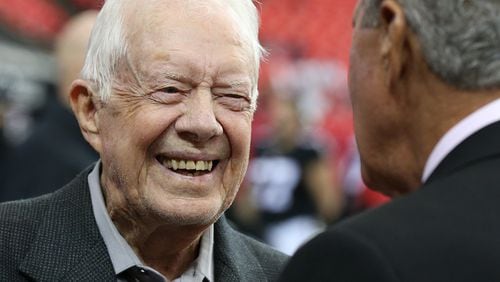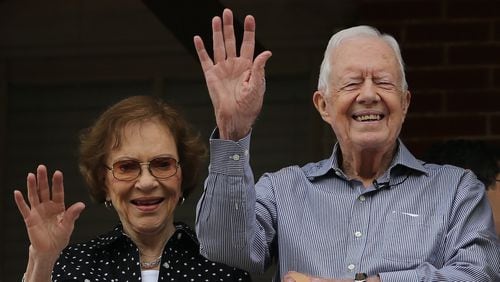It was the first Sunday after the presidential debate between Vice President Kamala Harris and former President Donald Trump, and Les Francis couldn’t wait to start the Zoom call.
At 4 p.m. folks began to trickle in and, as with every Zoom call in the history of Zoom calls, someone complained about someone’s mic being open. A few people threw out some jokes before someone shared the news that James Sasser, a three-term Democratic senator from Tennessee who went on to serve as the U.S. ambassador to China, had died.
Francis called on Republican strategist Frank Donatelli to talk about an article that Donatelli and Francis co-wrote about the debate for Real Clear Politics.
The group that calls itself Carter Old Farts Amiable Discussions, or COFAD, had officially been called to order.
What followed — while the baseball pennant races were heating up and a full slate of NFL games were being played — were 90 minutes of spirited but serious conversation about politics, the upcoming election, immigration and mass shootings.
For the last few years, several of former President Jimmy Carter’s former aides, advisers and cabinet members, along with journalists, friends and admirers, have regularly gathered for private Zoom meetings to talk, keep in touch and just hang out.
Many have known each other since the early days of the 1976 Carter campaign, before joining Carter’s White House.
But as Carter approaches his 100th birthday on the eve of a tight presidential election, the conversations have become more urgent, focusing on the state of American democracy.
“Anybody who has ever worked in any White House has gone through some tough fights whether legislatively or politically. But you become friends. So this is an opportunity to talk with people who are knowledgeable, aware and engaged in the political process,” said Francis, Carter’s former White House deputy chief of staff. “We went through a lot together, so there are bonds there.”
Like Carter, group members are old. Some are in their 90s. Some have died in recent years. Carter, whose 100th birthday is Oct. 1, has been in home hospice since February of last year.
It is clear the group, with their connections to Carter, leans heavily Democratic and is pushing for ways to get Harris elected. (Carter, who has criticized Trump in the past, told his family last month he wants to live long enough to vote for Harris.)
In an email containing the Zoom link to the latest meeting, the first topic of the agenda read: “Kamala Harris’ butt whupping of Donald Trump in the 9/10 debate! Any wonder why he doesn’t want to do it again?”
Still, they have invited Republicans to come speak at their meetings.
“We are not structured and we don’t have a charter,” said Jay Beck, a former special assistant to President Carter and one of the principal organizers of the annual Carter Center Weekend, an annual retreat and fundraiser. “We are just all passionate about President Carter, our country and talking about ways that the world can be a better place.”
A certain level of irreverence
Beck shook Jimmy Carter’s hand for the first time in 1966, during his first run for Georgia governor. Carter came in third in the Democratic primary, but Beck was sold.
When Carter was elected governor in 1970, Beck interviewed him as a young reporter at the Newnan Times-Herald. He went on to work in the Peanut Brigade as a campaign volunteer during the 1976 presidential election and followed Carter to Washington.
“In those early days, we slept on the floor and ate peanuts. We were all pretty young and when most of us got involved, we did it for love. We thought Carter was doing the right thing. We were idealistic,” Beck said.
After Carter lost the 1980 election, many of the people who worked for him remained friends and stayed in touch. Beck served as a kind of class secretary keeping tabs on everyone and publishing a Carter-Mondale newsletter that went out to more than 1,000 people.
Most communications were ad hoc and done via phone and email, but with the advent of the coronavirus pandemic, they did like everyone else — started meeting over Zoom.
“All of us have time on our hands,” Beck said.
Francis became the de facto moderator because he might have been the only person in the group who had a Zoom account, which his daughter had set up for him.
But first, they needed a name.
Timothy E. Kraft, the former White House director of political affairs, who died in January, came up with it.
“It wasn’t carefully considered,” said Beck, 79. “But it fits for us. I am a terrible old fart.”
Added Francis, 81: “I guess we all qualify as old farts. We have never been above a certain level of irreverence.”
There are about 90 members of COFAD and generally about 40 people attend the meetings that started as just gatherings, but soon evolved into more formal meetings with invited speakers like politicians, journalists and authors.
Former presidential candidate Dick Gephardt, the former House Democratic leader from Missouri, is a regular attendee. As are former Colorado senators Gary Hart and Timothy Wirth.
Authors and media figures Chris Matthews, Judy Woodruff, Joe Klein and Stuart E. Eizenstat attend meetings often. So do a host of former deputies, secretaries and special assistants.
Former Vice President Walter Mondale and former Secretary of State Madeleine Albright were charter members and regular attendees. Mondale and Albright died in 2021 and 2022, respectively.
“We thought all these people had interesting things to say,” Beck said.
Francis insists, however, they are not “an organization.”
“It is just a natural thing,” Francis said. “It just grew organically.”
Making a difference
It is not all talk.
As the 2024 presidential election season was getting underway and it was obvious that President Joe Biden would likely face Trump, the group had a vigorous discussion about third parties and fringe candidates, particularly No Labels, which was trying to field a bipartisan “unity ticket” backed by a reported budget of $70 million.
COFAD members argued that No Labels would only benefit Trump and wondered what they could do.
After the meeting, Gephardt put together Citizens to Save Our Republic, a group of former Democratic and Republican lawmakers aimed at stopping No Labels.
In April, No Labels announced the group would not nominate a third-party presidential candidate this year.
Carter’s presence abounds
Carter has never attended a COFAD meeting, and aside from any medical updates, the meetings spend little time directly talking about him.
But his presence is everywhere.
“We were soldiers in a sense and he was our leader,” said J. Brian Atwood, who served as Assistant Secretary of State for Congressional Relations during the Carter administration. “We were in a war with him. So that’s why we feel the loyalty.”
A meeting was scheduled last November on the day it was announced that Rosalynn Carter, Jimmy Carter’s wife of 77 years, had died. After a brief discussion, they voted to hold the meeting in her honor.
During the Democratic National Convention last month, the email chain leading up to a meeting was filled with comments about grandson Jason Carter, who spoke on behalf of the family.
“Jimmy Carter never gives up in his focus on what he so strongly believes is in the best interest of the United States,” said Barry Jagoda, a former special assistant to Carter and author of “Journeys With Jimmy Carter and Other Adventures in Media.” “This focus on the national well-being has always been a reason so many of us continue to have such great regard and so much respect for Carter.”
Matthews, who wrote speeches for Carter before becoming a political TV commentator, said the people who worked for Carter were struck by how genuine and sincere he was. That has carried on.
“After he lost the reelection in 1980, he devoted himself to public service and stayed involved,” said the former host of “Hardball” with Chris Matthews. “He didn’t treat the presidency as a gig. It was him.”
Better Angels
About 30 minutes into Sunday’s Zoom meeting this month, journalist and former Newsweek reporter Eleanor Clift, who credits Carter for her career because she was allowed to cover his 1976 campaign as a cub reporter, broke in with news that there might have been another assassination attempt on Trump’s life.
With fewer than 50 days to go before the election, Francis told the group that they are going to increase the rate of the meetings, at least until Nov. 5.
Carter biographer Jonathan Alter closed out the meeting by telling a story about his forthcoming book, which is about Trump. He admitted Trump had “shaken my faith,” but felt hopeful Harris could win in November, “because people need the idea of these better angels.”
In 2015, when Trump came down the escalator to announce his run for the presidency, Alter was in the Jimmy Carter Presidential Library doing research for “His Very Best: Jimmy Carter, a Life.”
He was summoned to appear on television, where he doubted that Trump would get the Republican nomination, but voiced concerns over his rhetoric about Mexicans and immigrants.
“I went back to the library, every time I turned a page, it brushed away the toxins that I was watching with Trump,” said Alter, whose latest book “American Reckoning: Inside Trump’s Trial — and My Own,” comes out in October. “Trump was not able to live rent-free in my head, because Jimmy Carter was occupying the premises.”
About the Author






